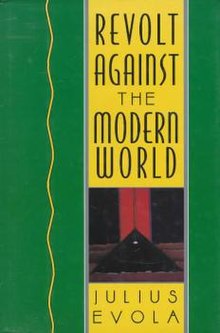This article needs additional citations for verification. (October 2016) |
 First edition English hardcover, published by Inner Traditions in 1995 | |
| Author | Julius Evola |
|---|---|
| Original title | Rivolta contro il mondo moderno |
| Language | Italian |
| Subject | Traditionalism, Western esotericism, Fascist mysticism |
| Genre | Philosophy |
| Publisher | Inner Traditions |
Publication date | 1934 |
| Publication place | Italy |
Published in English | 1995 |
| Media type | |
| Pages | 375 (Inner Traditions) |
| ISBN | 0-89281506-X |
| OCLC | 5930915 |
| This article is part of a series on |
| Conservatism in Italy |
|---|
 |
Revolt Against the Modern World (Italian: Rivolta contro il mondo moderno) is a book by Julius Evola, first published in Italy in 1934. Described as Evola's most influential work, it is an elucidation of his Traditionalist world view.[1] The first part of the book deals with the concepts of the Traditional world; its knowledge of the bridge between the earthly and the transcendent worlds. The second part deals with the modern world, contrasting its characteristics with those of traditional societies: from politics and institutions to views on life and death. Evola denounces the regressive aspects of modern civilisation, and instead argues for a traditionalist society.
Rivolta contro il mondo moderno was published in Milan by Hoepli in 1934. A revised and augmented edition was published in 1969. Translated into English by Guido Stucco (from the 1969 edition), it was published by Inner Traditions. It has also been translated into German, Spanish, French, Serbian and Hungarian.[2] It is known as a cult book in the extreme right circles.[3] The book influenced Mircea Eliade and other thinkers in the Traditionalist school, as well as the European Nouvelle Droite.[4]
- ^ Horowitz 2017.
- ^ "Rivolta contro il mondo moderno". Julius Evola Bibliography. Arrakis. Archived from the original on 15 May 2011. Retrieved 9 September 2015.
- ^ Drake 1986, p. 64.
- ^ Wolff 2016, pp. 478–494.